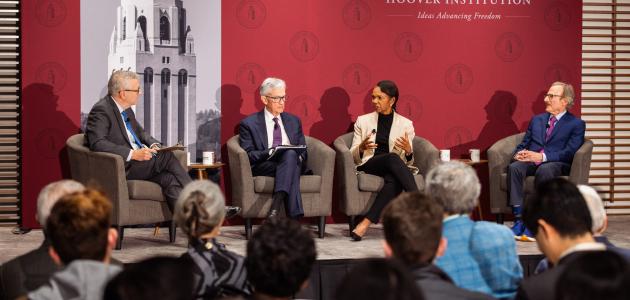In this edition of the Technology Policy Accelerator Newsletter, Hoover officially launches the Technology Policy Accelerator to help government and business leaders navigate a rapidly changing technological landscape. And Senior Fellow Drew Endy addresses Congress and advises it that government support will be necessary to ensure the synthetic biology sector meets its full potential to benefit humanity.
Highlights

Hoover Institution Launches Technology Policy Accelerator to Guide US Innovation
On June 16, the Hoover Institution officially launched the Technology Policy Accelerator (TPA), a bold new initiative aimed at helping US government and business leaders navigate the rapidly evolving landscape of emerging technologies and their implications for national security, economic growth, and global leadership.
TPA’s mission is to support better-informed policymaking by producing insights that clarify how emerging technologies are reshaping geopolitics, society, and the economy. It operates as a collaborative hub—connecting Silicon Valley and Washington, academia and industry, and science and strategy—to foster dialogue and advance understanding across sectors.
TPA scholars contribute to these efforts through cutting-edge research, briefings to government leaders, congressional testimonies, and wide-ranging public engagement across media platforms. They also convene conferences and seminars that bring together experts from government, industry, and academia to exchange ideas and explore solutions to pressing technology policy challenges.
Read more here.
Watch highlights from the event here.

Biotech Sector Needs Government Support to Fuel Innovation
Testifying on Capitol Hill on June 5, Senior Fellow and Science Fellow Drew Endy told the Research and Technology and Energy Subcommittees of the House Committee on Science, Space, and Technology that “biology is the next-to-mature general-purpose technology.” As he noted, “We already use biotechnology to grow essential medicines, foods, fuels, and some materials. Going forward, we can leverage biotechnology to help grow data storage systems, electronics, energetics, consumer biologics, [and] advanced cellular agents.”
To maintain US competitiveness in this area, Endy calls for prioritizing “spending public funds on foundational discovery science and biotechnology tool development.” The stakes are high, as in Endy’s view, “Whichever nation best understands biology, from cells to ecosystems, will hold an extraordinary advantage in imagining and making biotechnologies real.”
Read more here.
Watch the testimony here.
More Insights

Can the US “Onshore” Top Talent?
Also in Defining Ideas, Science Fellow Norbert Holtkamp argues against recent government directives to curtail the number of student visas issued by American universities to foreign students, saying the move could reduce the number of talented students entering STEM fields in the United States and hamper continued US dominance in areas such as artificial intelligence and advanced manufacturing.
Holtkamp argues the “deal” for the US is sweet. “The country of origin provides education, selects the top talent, and often pays for students’ expenses in the US education system,” he writes. After graduation, approximately 77% of those graduates remain in the US to work, paying income taxes here instead of in their home countries.
In place of curtailing student visas, Holtkamp offers a four-point plan to ensure a stable pipeline of technology talent flows to the US. It involves more investment in STEM education at the K–12 level in the US, expansion of foreign work visa programs, and continued scientific collaboration with other countries.
Read more here.
About the Technology Policy Accelerator
The Hoover Institution’s Technology Policy Accelerator conducts research and develops insights that help government and business leaders better understand emerging technology and its geopolitical implications so they can seize opportunities, mitigate risks, and advance American interests and values.
About the Stanford Emerging Technology Review
The Stanford Emerging Technology Review is a product of a major Stanford education initiative that provides an in-depth explanation of pivotal tech domains, recent developments within them, and what to look out for in the future.























